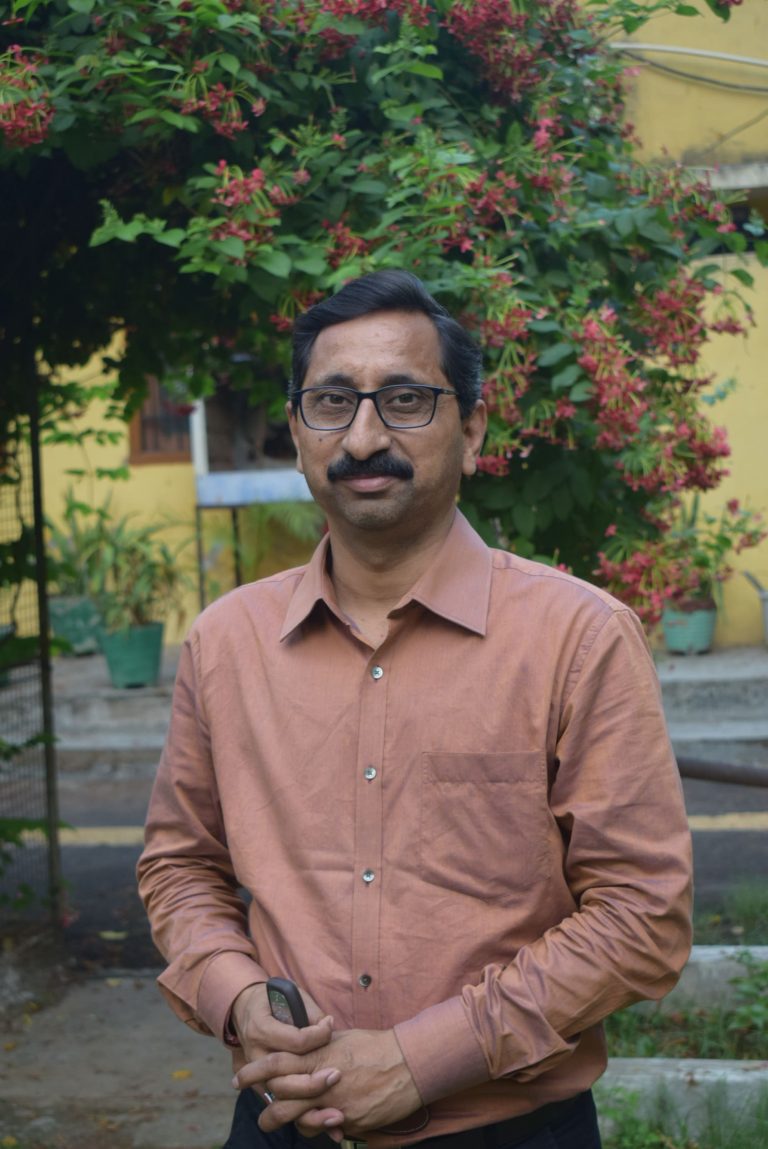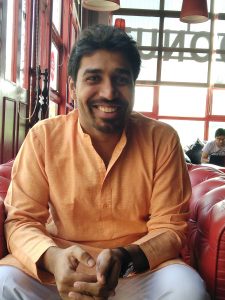
Grit and a Motivated Team - Key to Enabling Systemic Education Change in the State
In conversation with Manoj Kaushik, Head, Educational Technology Department & Testing & Assessment Department, SCERT, Govt. of Haryana

How did your journey in the school education space start?
A friend and I were the typical nerds/ achievers – loved by teachers and shunned by classmates. Together we used to conduct M.Sc classes for our peers, while being enrolled in the same course. We were already holding classes [at our homes] for school students even during graduation. Over the years, I found teaching to be a very satisfying experience. After finishing the course, I became a lecturer in college and was there for about five years. Then in 1996, when an acquaintance insisted, I applied for a school teacher position with the Haryana Education Department and that is how my journey in public school education started.
27 years is a very long time. What were the different roles you have played with the department?
There have been many. In 1996, I started off as a Grade 6 teacher in Nuh, Mewat (located close to the Rajasthan border), teaching 5-6 uninterested students under a tree. In the same year, I took up the role of Science Teacher Training Coordinator. In 1997, I moved to Model School Wazirabad, Gurugram as the Physics Lecturer. Then in 2004, I joined SCERT as a Master Trainer and Physics Resource Person. I was also a Trainer in-Charge, Samagra Shiksha Abhiyan for the state, Nodal Coordinator for DIKSHA where we worked on content development and coordination. I was also a Principal at GSSS Bayal Mahendragarh for a year. Today, I head the Educational Technology Department at SCERT.
It will be difficult to capture your journey over the past 27 years with the Department. From the plethora of your work, what are the different initiatives you are proud of?
With Samagra Shiksha Abhiyan, I have designed and implemented teacher training programs focused towards activity based learning for which I received state level appreciation. In 2006, Haryana was among the first states in the country to implement EDUSAT at a large scale across its 15000 schools, colleges and polytechnics. Me and my team were responsible for the first academic content development and coordination of resources.
From 2006, in the Education Technology Wing, we onboarded more than 150 teachers across subjects and grades, built their comfort to face cameras, built a studio, created, reviewed and moderated content. Every week, we created more than 25 videos [of 30 mins duration] for Grades 1 -12. Now for more than 17 years we have had a school telecast schedule and a separate website with the repository of the content from where content can be accessed from anytime in the past.
In 2018 SCERT was made the nodal agency for DIKSHA. We recruited resource persons, taught them DIKSHA tools and techniques. Over 4-5 months, we were able to upload 2000 videos on DIKSHA and today the number has reached around 10000.
In 2021, we attended a virtual training by NCERT on content development through 15-16 softwares. We presented a roadmap on the last day for implementation in the state and executed it immediately. We called the DIETs across the state, asked for volunteers and 145-150 teachers, BRPs, DIET members signed up. They learned what we had learnt and they in turn organised the same in their districts. Because of this exercise, without studios, grant or other resources we were able to create topic based new videos for DIKSHA and also enriched EDUSAT.
What are the key challenges in your role? How do you navigate these challenges?
The first one is to engage and work with people who are actually willing to execute and realise the vision. Earlier people who were nominated [for any initiative] asked “why have we been called” [and made to be part of the initiative] and people who were not nominated said “why weren’t we called”. We have addressed this by engaging stakeholders through a Google Form.
We roll out the details, willing stakeholders sign up themselves, they volunteer to be part of the initiative. This has now become a norm for all programs and initiatives.
The second challenge has been to run the projects, build capacity and conduct outreach, at scale with limited resources. We have 14000 schools in the state and even with sufficient talent and willingness, it is difficult to reach all stakeholders. This is addressed by running all possible initiatives virtually. WhatsApp, email and social media are powerful mediums. It increases both the reach and hence the number of stakeholders who become invested in the program and drive outcomes in their schools/ blocks/ districts. Over the years, we have been able to run 99% projects without grants. Our [NGO] partners also support our initiatives. They are our strength and help us realise the vision with professionalism.
There is also a motivated team [which is constituted by people who sign up for initiatives through the Google Form] at different levels – cluster, block, district. They help us spread the messages quickly, roll out programs effectively. The team also constantly learns from each other – conceiving, designing programs and improving process management.
Over the years, what has kept you going?
First thing is the fact that I don’t like to sit idle and I want the same for the team as well – the task of achieving student outcomes is huge and we have to continuously be at it. Secondly, the motivated group of teachers, mentors from across the state who I am connected with virtually, their willingness to continuously improve the education system [evident through their responses during live sessions, chats on WhatsApp group] fills me with energy. They are very receptive to what we have to say, offer [being from SCERT]. Their faith is an immense source of energy as well.
You have held several leadership positions. Why is it necessary? What role do you see the education leaders play in the ecosystem?
School level changes cannot happen without the School Leader’s consent or prioritisation of the needs by them. Only they can come up with a vision, plan and ideas and work with the team to materialise the same. I saw that as a School Leader myself [in Mahendragarh]. It was a neglected school. I picked up small projects – plumbing, fencing, using unused rooms to engage students further, getting digital boards there. I did not wait for inputs from anyone, I identified the needs and made sure the initiatives did not hit any roadblock. This is a school leader’s role.
Also, in the system the leadership positions are not formally filled and senior teachers play the dual role of the school leadership. The tag helps things move, otherwise the progress will be very slow. A school leader has to role model behaviours, actions and mindsets that they want to see in the team and the community.
What are the tips that you would like to share with the education leaders on how they can drive change in their schools/ regions?
The education leaders should focus on resource leadership – how can the existing resources be amplified. Instead of focusing on what’s not present or available, they should think of innovative ways to utilise what’s available to them and how the processes can be optimised with its help. Innovation in schools/ classrooms is a key differentiator of student outcomes and they should constantly think of practices that would aid that.
How do you think the micro-improvements approach is relevant for the education ecosystem in the Haryana State [having adopted the same at Aao School Chalein Program recently after Vidya Amrit Mahotsav]?
It is very much relevant. Thinking of smaller milestones would help the teachers and school leaders in bringing improvement at school level. The approach broadens different perspectives, facilitates development of the best plan, even for a week/ a month, that could be a part of a bigger goal at school level. In a nutshell, it’s effective and helps in visualising short term results.
Meet the Author

Luv Kumar
Having fallen in love with stories in his childhood, Luv makes his living as a storyteller. He strongly believes in the power of stories to make this world a better place. Luv currently manages communications at ShikshaLokam to drive collective action for enabling education leadership. He is a Teach for India Alum and has also worked with non profit education startups & media agencies in the past.

Luv Kumar
Having fallen in love with stories in his childhood, Luv makes his living as a storyteller. He strongly believes in the power of stories to make this world a better place. Luv currently manages communications at ShikshaLokam to drive collective action for enabling education leadership. He is a Teach for India Alum and has also worked with non profit education startups & media agencies in the past.
